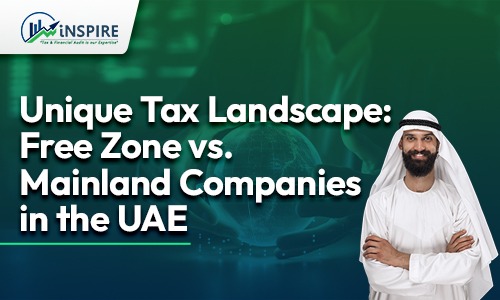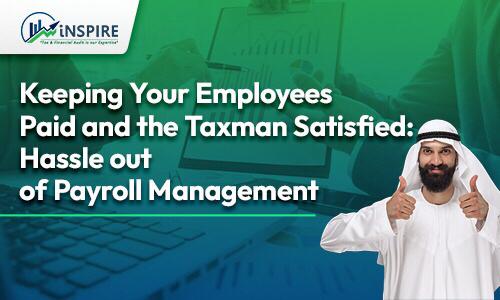
Unique Tax Landscape: Free Zone vs. Mainland Companies in the UAE
The United Arab Emirates (UAE) stands as a beacon of economic dynamism, attracting businesses from around the globe. However, understanding the distinct tax environments for free zone and mainland companies is pivotal for success. In this blog, we explore the tax nuances that differentiate these two business setups, shedding light on the intricacies of corporate taxation in the UAE.
Unique Tax Landscape: Free Zone vs. Mainland Companies in the UAE
Introduction:
The United Arab Emirates (UAE) stands as a beacon of economic dynamism, attracting businesses from around the globe. However, understanding the distinct tax environments for free zone and mainland companies is pivotal for success. In this blog, we explore the tax nuances that differentiate these two business setups, shedding light on the intricacies of corporate taxation in the UAE.
Free Zone Companies: Unraveling the Tax Benefits
1. Corporate Income Tax
The allure of 0% corporate income tax in many UAE free zones is a game-changer for businesses. This means that profits generated within these zones are shielded from corporate income tax, offering a significant advantage for companies seeking tax-friendly environments.
2. Customs Duties
Free zone companies enjoy exemptions from import and export duties, facilitating seamless international trade. This makes free zones strategic hubs for companies engaged in cross-border activities.
3. Value Added Tax (VAT)
While VAT is applicable to goods and services, the standard rate applies to free zone companies. A careful consideration of VAT implications is crucial for businesses to ensure compliance with tax regulations.
4. Withholding Tax
One of the perks for free zone entities is the absence of withholding tax on dividends, interest, or royalties. This creates a more favorable environment for financial transactions within and outside the free zone.
5. Personal Income Tax
Employees working in free zones benefit from the absence of personal income tax, contributing to the overall appeal of these zones for both businesses and their workforce.
Mainland Companies: Balancing Advantages and Responsibilities
1. Corporate Income Tax
As of the last update, mainland companies generally don't face federal corporate income tax. However, certain emirates may have introduced economic substance regulations, emphasizing the need for a thorough understanding of local tax laws.
2. Customs Duties
Mainland companies may encounter customs duties on imports and exports. It's crucial to factor these duties into the overall cost structure for businesses engaged in international trade.
3. Value Added Tax (VAT)
VAT is applicable to mainland companies at the standard rate. Businesses must navigate VAT compliance, ensuring accurate reporting and adherence to regulations.
4. Withholding Tax:
The absence of a general withholding tax regime is favorable for mainland companies. However, the presence of specific provisions in double tax treaties may impact withholding tax on certain types of income.
5. Personal Income Tax:
Much like free zone counterparts, employees in mainland companies benefit from the absence of federal personal income tax.
Conclusion: Strategic Decision-Making for Business Success
Understanding the tax implications for free zone and mainland companies in the UAE is essential for strategic decision-making. While free zones offer enticing tax benefits, mainland companies provide a broader market reach. Businesses must stay vigilant, seeking professional advice to navigate the ever-evolving tax landscape in the UAE. By aligning their structures with these tax considerations, companies can position themselves for success in this thriving economic hub.











